Large Ranch Home That is Easy to Build
In this guide
2022 Notice: The Effect of the Pandemic on the Construction Industry
What Is a Ranch-Style House?
Cost to Build a Ranch Home by Type of Construction
Ranch House Cost per Square Foot
Cost to Build a Ranch-Style Home by Number of Bedrooms
Cost to Build a Ranch Home by Number of Stories
Types of Ranch Houses
Ranch-Style Home Construction Cost Breakdown
Labor Cost to Build a Ranch House
Factors Affecting the Cost of Building a Ranch House
Additions to a Ranch House Cost
Adding a Second Story to a Ranch House Cost
Advantages and Disadvantages of a Ranch Home
Cost to Raise Roof on a Ranch House
Raised Ranch vs Split Level
Bungalow vs Ranch
Enhancement and Improvement Costs
Additional Considerations
FAQs
2022 Notice: The Effect of the Pandemic on the Construction Industry
Over the last two years, the pandemic has had an enormous impact on the construction and housing industries. What began as a lumber shortage driving prices up quickly became supply chain issues with multiple materials involved in building homes, including ranches. Materials like lumber, concrete, drywall, and glass are all experiencing volatile pricing and short supply.
At the same time, overall construction costs have risen and are expected to climb a further 4% to 7% in 2022. This is due to rising material costs and supply and labor shortages throughout the industry.
Coupled with this, the housing shortage is expected to continue into 2022. This means that many people will be looking to build new homes like ranches. With ranches being one of the most popular housing styles, many people looking to build during the housing shortage may look to this style. Therefore, it is recommended that anyone considering building a ranch in 2022 sign a contract quickly to help lock in costs before they rise higher. This will also get your project in line quickly before demand can cause further delays.
What Is a Ranch-Style House?
A ranch is a type of architecture first created in California in the 1920s. It is also known as the American Ranch, California Ranch, rambler, and rancher. Essentially, a ranch is a single-story home that has long lines close to the ground. They are usually asymmetrical in shape and have an open floor plan on the interior. Different types have emerged over the years that include different levels, attached garages, varying rooflines 1 , dormers, and other features. This means you can have a ranch with 1½ or 2 stories, but these are rare. Different styles include the storybook ranch, which has custom details and dormers, the split level, which has a 1½-story section for added space, and the suburban ranch, which is smaller than the traditional California style. The ranch is considered a contemporary home style in many ways because it has an open floor plan.
Cost to Build a Ranch Home by Type of Construction
Ranches can be built using traditional stick-building methods. They can also be built using modular or prefab methods. In a stick build, the home is built on-site. In modular builds, the home is mostly constructed off-site, and then transported to the final location where it is finished. By building indoors in a controlled environment, modular ranches can often be built for less than stick-built ranches.

| Type of Construction | Average Costs (Labor Included) |
|---|---|
| Modular | $75,000 - $391,000 |
| Stick-Built | $200,000 - $600,000 |
Ranch-Style Prefab Homes Price
The cost of a modular ranch is $75,000 to $391,000. The range includes prefab builds and custom modular builds. Like all homes, ranches come in many sizes and styles. The most common sizes range from 1,500 to 1,700 sq.ft. The above prices reflect these costs. Larger or smaller ranches may fall outside this range.
Stick-Built Ranch-Style Homes Price
The cost to build a custom stick-built ranch ranges from $200,000 to $600,000. Stick-built homes are constructed on-site. They come in many different sizes and styles, like modular homes. However, they cost more to build than modular homes because of potential weather delays and uneven working conditions. They can also take longer, meaning more manpower and higher costs. Functionally, there is little-to-no difference between the two home types once built.
Most ranches fall between 1,500 and 1,700 sq.ft. But like many homes today, they have become larger, reaching 2,000 sq.ft. and sometimes larger. Most ranches are a single story. A larger home means spreading the house farther, which is difficult for most standard-size house lots. The larger the house, the less space there is for the yard. While you can build a raised ranch or a split for additional room, these tend to have a fairly strict footprint 2 limiting their size. The average price of a stick-built ranch is $130 to $300 a square foot, with most people paying $200 a square foot. The cost of a modular construction is $50 to $230 a square foot, depending on whether you use a prefab or custom design. Below are the average costs for varying sizes of ranches.

| House Size | Average Costs for a Modular Ranch (Labor Included) | Average Costs for a Stick-Built Ranch (Labor Included) |
|---|---|---|
| 1,000 sq.ft. | $50,000 - $230,000 | $130,000 - $300,000 |
| 1,200 sq.ft. | $60,000 - $276,000 | $156,000 - $360,000 |
| 1,300 sq.ft. | $65,000 - $299,000 | $169,000 - $390,000 |
| 1,400 sq.ft. | $70,000 - $322,000 | $182,000 - $420,000 |
| 1,500 sq.ft. | $75,000 - $345,000 | $195,000 - $450,000 |
| 1,700 sq.ft. | $85,000 - $391,000 | $221,000 - $510,000 |
| 2,000 sq.ft. | $100,000 - $460,000 | $260,000 - $600,000 |
Cost to Build a Ranch-Style Home by Number of Bedrooms
Ranch homes have a wide range of bedrooms based on size and type. Keep in mind that many ranches are single-story homes. While some California ranches can be long and sprawling, many suburban and split ranches are smaller. This can limit the number of bedrooms you can fit. You can always have larger homes with fewer bedrooms, but it becomes more difficult to fit a large number of bedrooms into a larger home.
Below is the average cost to build a ranch using modular and stick-building construction methods by the number of bedrooms. Costs are for the average home size based on the number of bedrooms.

| Number of Bedrooms | Average Costs for a Modular Ranch (Labor Included) | Average Costs for a Stick-Built Ranch (Labor Included) |
|---|---|---|
| 1 Bedroom | $40,000 - $230,000 | $104,000 - $300,000 |
| 2 Bedrooms | $50,000 - $276,000 | $130,000 - $360,000 |
| 3 Bedrooms | $70,000 - $391,000 | $182,000 - $510,000 |
| 4 Bedrooms | $85,000 - $437,000 | $221,000 - $570,000 |
| 5 Bedrooms | $100,000 - $460,000 | $260,000 - $600,000 |
1-Bedroom Ranch-Style House Prices
The cost of a 1-bedroom ranch-style home ranges from $40,000 to $230,000 for a modular build. The price of stick-built construction is $104,000 to $300,000. These costs assume a home ranging from 800 to 1,000 sq.ft. If your home falls outside these parameters, your costs could be different. Many suburban and storybook ranches can be single-bedroom homes. They are less common than 2 and 3-bedroom ranches.
2-Bedroom Ranch-Style Home Prices
The cost of a 2-bedroom ranch-style home is $50,000 to $276,000 for a modular build. The cost of stick-built construction averages $130,000 to $360,000. These prices assume a home from 1,000 to 1,200 sq.ft. If your home falls outside this range, your costs could be different. Many types and styles of ranches have two bedrooms. Depending on the ranch type and layout, the bedrooms could be located at opposite ends or the same end, across the hall from one another.
3-Bedroom Ranch-Style Home Prices
The cost of a 3-bedroom ranch-style home is $70,000 to $391,000 for a modular build. The price for stick-built construction ranges from $182,000 to $510,000. These prices assume a home that is 1,400 to 1,700 sq.ft. This is one of the most common number of bedrooms for ranches. Split-level ranches may have a master bedroom in the raised portion and 2 others in the main section. Some California ranches have 3 bedrooms that may be clustered or spread. You can configure a ranch in many ways to fit 3 bedrooms comfortably.
4-Bedroom Ranch-Style Home Prices
The cost of a 4-bedroom ranch-style home averages $85,000 to $437,000 for modular construction. The cost of stick-built construction is $221,000 to $570,000. This assumes the home ranges from 1,700 to 1,900 sq.ft. However, you can have 4-bedroom ranches that are slightly larger. In this case, your costs could be different. Four-bedroom ranches are more uncommon than 3-bedroom homes. They are generally split-level, raised, or California-style because these are the largest footprints.
5-Bedroom Ranch-Style Home Prices
The cost of a 5-bedroom ranch-style home ranges from $100,000 to $460,000 for modular construction. The cost of stick-built construction averages $260,000 to $600,000. This assumes a home of roughly 2,000 sq.ft. If your home is larger, your costs could be different. Five-bedroom ranches are very uncommon. It becomes difficult to fit 5 bedrooms into the various layouts in a ranch. Like 4-bedroom ranches, the most common ranch-style homes that can fit this many bedrooms are split-level, raised, and California.
Cost to Build a Ranch Home by Number of Stories
The original ranch-style home was a single story, and most ranches built today are still single-story homes. However, depending on the ranch type you build, you may find your home could have 1½ or 2 stories. The home's cost varies by number of stories, but this can be misleading. Your foundation and roof size impact the cost of your home more than the number of square feet or stories. Therefore, a single-story home like a California-style ranch that is 1,500 sq.ft. may cost slightly more than a 2-story raised ranch that is 1,500 sq.ft. because the raised ranch uses less space. It has a smaller foundation and roof than the single-story California, so it can be less expensive to build. However, several things affect this, and the two costs end up being close to equal.
Even then, the square footage mainly impacts the total cost rather than the number of stories. Depending on other factors, such as the building material, style, and location, there may be little-to-no difference in costs, or a single story may cost slightly more than a two story. As you see below, the average price to build a 1,700 sq.ft. ranch does not vary tremendously based on stories, but 2-story stick-built homes can be slightly less expensive. Modular homes of this type do not vary as much in cost.

| Number of Stories | Average Costs for a Modular Ranch (Labor Included) | Average Costs for a Stick-Built Ranch (Labor Included) |
|---|---|---|
| 1 Story | $85,000 - $391,000 | $255,000 - $510,000 |
| 1½ Stories | $85,000 - $391,000 | $255,000 - $510,000 |
| 2 Stories | $85,000 - $391,000 | $221,000 - $510,000 |
One-Story Ranch House
The cost of a single-story ranch home of 1,700 sq.ft. is $85,000 to $391,000 for a modular build. The cost of a stick-built home of the same size averages $255,000 to $510,000. This is slightly more than 2-story homes because this home might need a larger roof and foundation. Most ranches are single story. This includes the suburban, California, and storybook ranches. Split-levels are single-story for most of the home and include a small section that is 1½ or 2 stories.
1½-Story Ranch House
The cost of a 1½ story ranch home of 1,700 sq.ft. ranges from $85,000 to $391,000 for a modular build. The price of a stick-built home of the same size averages $255,000 to $510,000. This is the least common ranch size. You are most likely to find 1½ stories on the split level and the raised ranch in some rare instances. Occasionally, a storybook home may also be 1½ stories because these homes tend to be the most customized. Because the home is not being extended that much and is usually a single story with only a small taller section, costs are the same as a single-story home.
2-Story Ranch House
The cost of a 1,700 sq.ft. 2-story ranch home ranges from $85,000 to $391,000 for a modular build. The price of a stick-built home of the same size is $221,000 to $510,000. The raised ranch is the only type with two stories. Raised ranches can look like a single story or 1½ story from the front because they are usually built into a hill. Alternatively, a raised ranch can be a single-story suburban or California ranch that was lifted and a second story built beneath it. These homes have different costs because the second story is technically an addition and not a new build.
Types of Ranch Houses
There are several variations on the original ranch, each with its own set of characteristics. Because the cost to build a ranch is based mostly on square footage, materials, and location, there is not much variation in the cost to build the various styles.

California Ranch
The California ranch is the classic-style ranch, a single-level home with long lines presented in a "U" or "L" layout. They are usually between 1,400 and 1,700 square feet in size and are normally built on a slab. They may have an attached garage at one end, and many have patios in the back.
Suburban
The suburban ranch is a smaller version of the California ranch. This style is slightly more compact in design and is usually under 1,500 square feet in size, with the average being closer to 1,200. They have the same open floor plan inside and are also usually built on a slab. These are sometimes known as a "basic" ranch, and they generally have the lowest prices to build because they do not have garages or special features.
Split-Level Ranch
A split-level ranch has the majority of the living space on one floor. But it has a small section on a second floor and a small section on a lower level, possibly a basement. Usually, this style has the bedrooms upstairs or at least a master bedroom upstairs and a finished basement room downstairs. This is not to be confused with the split-entry architecture style, which has stairs going up and down from the front entryway.
Raised Ranch
There are technically two types of raised ranches. The first is a new build - a home constructed as a two-story ranch from the beginning. In this case, the home usually looks like a single-story or a one-and-a-half story home from the front because the back is usually built into a hill that hides the lower level. The main living area is on the upper level, and there may be a finished basement family room or extra bedrooms below.
The second type of raised ranch is what happens if you have an existing California or suburban ranch, and you want more space but cannot build out. In this case, the ranch is literally raised - picked up off its foundation, and a second story is built underneath.
Storybook
The storybook ranch is also a single-story home but has more of a custom appearance than traditional ranches. It is usually smaller and includes dormer windows, front porch columns, angles, bump-outs, and other features that give it character and a unique design. This type of ranch often costs a little more per square foot, but because it is smaller, the total cost to build is usually in line with other ranches.
Ranch-Style Home Construction Cost Breakdown
The exact cost to build your home depends on multiple factors, including the size, materials, and location. However, ranches are typically built like other new homes, giving them a similar breakdown.
The following breaks down most of the major parts of the build for a general sense of costs. Costs are based on a 1,700 sq.ft. ranch.

| Project Area | Average Costs (Installed) |
|---|---|
| Prep-Work | $4,000 - $6,500 |
| Foundation | $9,500 - $15,000 |
| Framing | $45,900 - $91,800 |
| Roofing | $19,000 - $40,000 |
| Exterior Finishing | $25,000 - $35,000 |
| Major Systems | $40,000 - $75,000 |
| Interior Finishing | $51,600 - $56,900 |
| Kitchen | $40,000 - $50,000 |
| Bathrooms | $20,000 - $80,000 |
Prep-Work
The cost of the prep-work before building a new home ranges from $4,000 to $6,500. Every new build requires some preparation, including getting the permits, purchasing plans, scheduling inspections for utilities, land clearing, and hiring various professionals. Most of this work is coordinated by your builder or build firm. Some of this has no upfront costs, while others may have costs built into the prices above. If your home needs significantly more land clearing or contracting with an architect for custom plans, your initial costs can be higher.
Foundation
The cost of excavating and pouring your foundation is $7,000 to $18,000. Most ranches are built on slabs, but some have full basements, depending on the area. The type of foundation or ranch can vary depending on the type and location. For example, raised ranches are frequently built into hills. This can make the foundation and excavation different from those built on level ground. Your home's footprint also impacts your total foundation costs.
Framing
The cost to frame your home averages $45,900 to $91,800. Most ranches use a wood frame, which costs an average of $9 a square foot. Framing makes up roughly 18% of the total cost of your home's build. This does not include the cost to frame the roof but does include the sheathing for the home's exterior and sheathing insulation. Framing is one of the most important parts of the build. Once the frame is erected, the roof can be built, and the exterior finished.
Roofing
The cost to frame and shingle 3 the roof ranges from $19,000 to $40,000, depending on the materials. Because ranches are most commonly open-floor single-story homes, they use a truss roof framing. The truss 4 takes the weight so that you do not need load-bearing walls inside. Adding dormers or other specialty roof additions increases the cost. After framing and sheathing the roof, it can be shingled. This can use any shingle type, with most homes using an architectural-style asphalt shingle.
Exterior
The average cost to finish the exteriors of your ranch is $25,000 to $35,000. The exterior of a ranch is usually clad in a horizontal lap siding, with wood being the most common. But many feature vinyl and fiber cement 5 . In addition to your siding, you also have the house wrap, insulation, windows, doors, and paint to consider. Custom exteriors with dormer windows or extra trim can have higher finishing costs. This means storybook ranches tend to have higher finishing costs than other types.
Major System Installation
The cost to install your major systems and utilities averages $40,000 to $75,000. Like any new home, your ranch needs plumbing, electrical wiring, heating, cooling, ductwork, appliances, and various fixtures. Utilities must run through the attic because of the open floor plan. Things like recessed lighting 6 and forced hot air are common in ranches. However, you can change HVAC and electrical systems to your preference. The location of your ranch and whether you use city water and sewage or rely on a well and septic system changes your costs.
Interior Finish Work
The cost to finish the interiors of your new ranch ranges from $51,600 to $56,900. While ranches have a fairly simple layout, they still need finished work done on the interior, which includes insulation, drywall, flooring, lighting, closets, painting, and things like moldings, trim, and interior doors. Ranches are fairly contemporary in interior design and layout. They do not have much elaborate trim or many features. Flooring is typically hardwood or carpeting, but you can use vinyl, laminate, or tile. It is common to use similar finishes throughout the home because the space is open.
Kitchens
The average cost to add a kitchen to your ranch is between $40,000 and $50,000. Your kitchen typically includes countertops, cabinets, sinks, and faucets. Using custom or luxury materials in this space increases costs. Because of the open layout, it is common for the kitchen to have the same flooring and wall colors as the living room and dining room. You can add a half wall or other type of partition between the kitchen and living room or dining room. This can break up and delineate the space while adding extra counters and eating areas.
Bathrooms
The average cost to add a bathroom or bathrooms to your ranch ranges from $20,000 to $80,000. Many ranches have 1 or 2 bathrooms. Some have a full bath and a ½ bath, while others have 2 full baths and a ½ bath. It is rare to add additional bathrooms, but it can be done. Adding more bathrooms increases total costs. The number of bathrooms should be tied to the number of bedrooms, with 3 bedrooms being the most common.
Labor Cost to Build a Ranch House
Many professionals are involved with building your ranch. You may contract with a builder or build-design firm, which handles all the various labor aspects. You can also contract individually with each professional to handle the project management yourself. Below is an average breakdown of the labor costs by the professional.

| Professional | Average Costs (Labor Included) |
|---|---|
| Electricians | $40 - $120/hour |
| Painters | $50/hour |
| HVAC | $50 - $70/hour |
| Carpenters | $70/hour |
| Plumbers | $75 - $130/hour |
| Roofers | $1.00 - $1.50/sq.ft. |
| Flooring Installers | $5 - $20/sq.ft. |
| Concrete Workers | $110/cubic yard |
| Architects | 10% - 17% of the total building budget |
| Structural Engineers | $100 - $500/hour |
| Interior Designers | $75 - $450/hour |
| Landscapers | $45 - $75/hour |
Factors Affecting the Cost of Building a Ranch House
Like any new home build, many factors impact the cost of a new ranch. The first biggest factor impacting your cost is size. Since home construction is predominately based on a cost per square foot, larger homes generally cost more than smaller homes. Other factors include things like roof and foundation size and type and whether you have a garage. Materials and the level of customization you add, such as storybook ranches featuring dormers and arches, may also impact your total costs. Location can also play a significant role in your final costs. Some areas of the country cost more to build in on average than others. In many cases, you may also need to factor in the cost of the land you are purchasing and how much excavation and clearing it may need before building begins. Building on a pre-cleared lot costs considerably less than building on a heavily wooded lot that needs clearing first.
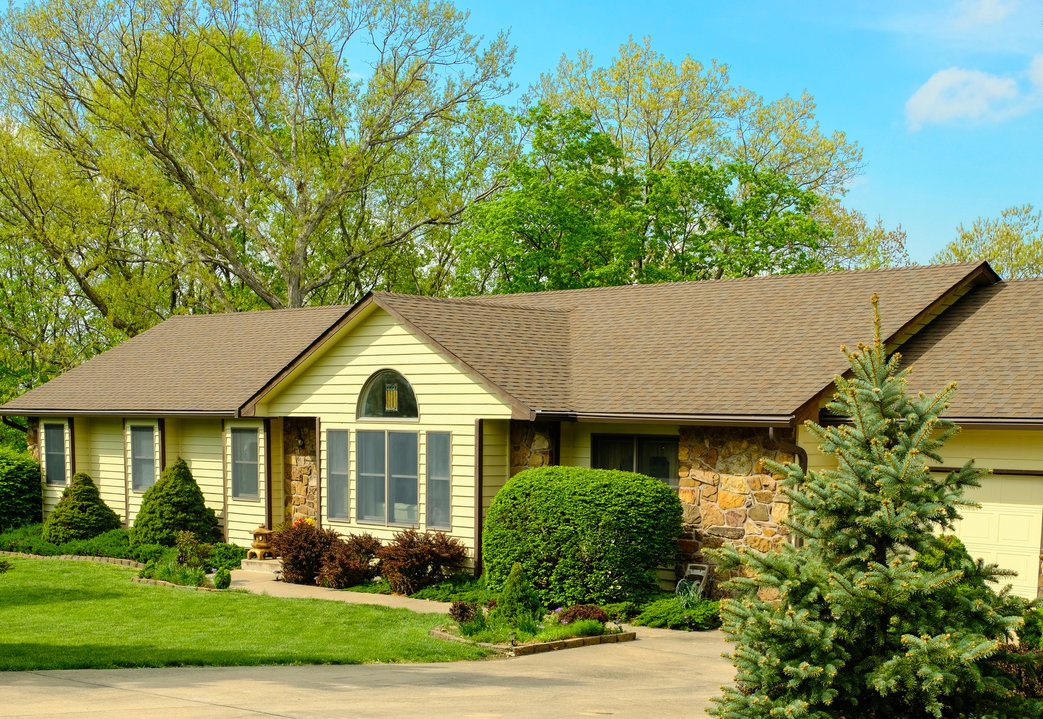
Additions to a Ranch House Cost
While it is not the easiest thing to expand a ranch, it is possible to make some additions. Many people add front porches, mudrooms, and patios. In addition, expect to pay around $200 a square foot for a finished addition to a ranch house. Your exact costs may be higher or lower, depending on the addition type, location, and materials used.
You can add many additions to a new or existing ranch, including porches, garages, driveways, and pools. Not all these additions are necessary for your home's use. Some may be added later, while others you may want to add during the new build. Below are the average cost ranges for some of the most popular home additions.

| Type of Addition | Average Costs (Installed) |
|---|---|
| Fence | $1,500 - $3,000 |
| Driveway | $3,200 - $10,000 |
| Deck | $5,000 - $15,000 |
| Mudroom | $7,000 - $15,000 |
| Landscaping | $8,000 - $15,000 |
| Pool | $10,000 - $100,000 |
| Porch | $12,000 - $30,000 |
| Garage | $22,000 - $60,000 |
| Second Story | $30,000 - $50,000 |
Fence Addition
The cost to fence in a yard at your home costs between $1,500 and $3,000. There are many fencing types, such as several styles of wood, vinyl, and metal fences, that work well with ranches. Ranches do not have a specific fence type that complements the home style. However, many regions have fencing styles that may make one a better fit with where you live. When fencing in an area larger than the average yard, costs range from $5 to $10 a linear foot installed.
Driveway Addition
The cost of a driveway addition is $3,200 to $10,000. Every home needs a driveway, but the size, type, material, and style can vary. Driveways are mostly gravel, concrete, or asphalt, with some materials being more common in certain areas. Concrete is more common in the south, while asphalt is more popular in the north. Your driveway length, whether it is on a hill, and the shape and width impact your final costs. Depending on how much space you have, you can also add extra parking or turnarounds.
Deck Addition
The cost of a deck addition averages $5,000 to $15,000. Because most ranches are single-level homes, most use a platform style. This is a deck raised slightly above the ground. It may be a walk-out directly from the home or positioned elsewhere in the yard. If you have a raised ranch, you can add a more traditional deck. Overall costs vary by the deck size and type.
Mudroom Addition
The cost of a mudroom addition ranges from $7,000 to $15,000. Mudrooms are common additions to many homes today. This space can be a good transition area between the outdoors and interior. You can use it for additional storage of outdoor belongings or organize your family. Mudrooms come in different sizes and may be full additions or a repurposed existing area. In most cases, they are located at an entrance to the home.
Landscaping
The average cost of landscaping is $8,000 to $15,000. Frequently after a new home build, the yard and surrounding area need a lot of attention. This can include leveling the yard after heavy equipment has been through, planting grass seed or laying sod, and adding bushes or trees around the home. You can also add retaining walls and other features as needed. Some builders include a few small landscaping additions as part of the project. This may include grass seed and a walkway, so always ask and see what is offered.
Pool Addition
The cost of a pool addition averages $10,000 to $100,000. If you have the space, a pool can make a great addition to any home. Pools give you a place to entertain, relax, exercise, or cool off on a hot day. You can add many swimming pool types to your property, including above and inground options of several shapes and sizes. Those low on space may want to consider a plunge pool, while those with plenty of room may want a full-size in-ground pool.
Cost to Add a Front Porch to a Ranch House
The cost to add a front porch to your home is $12,000 to $30,000. Most ranches do not have front porches, but it is possible to add one. The key is to make sure you do not attempt to wrap the house because the ranch profile makes this very difficult with its asymmetrical layout. Keep the porch simple and confined solely to the front area. Your porch may not need to be elevated because most ranches are single-level. This can impact appearance and costs.
Garage Addition
The cost of a garage addition ranges from $22,000 to $60,000. There are two basic types of garage additions. The first is the attached garage. This garage is the most common and is attached to the home. The attached garage is usually on one side in a raised ranch, with a room above it. Single-story ranches have the garage at one end. The second option is a detached garage. This is a garage located elsewhere on the property. This second option is usually more costly than the first.
Adding a Second Story to a Ranch House Cost
The cost to add a second story to an existing ranch home averages $30,000 to $50,000. Due to the way that the ranch is made, the most common way to add a second story is to "raise" the ranch. This means lifting the house off its foundation and building a new story below it. Your main living area is now the upper story, while the lower level becomes the addition. The lower level can be finished in many ways, and the level is generally a walkout to the yard. Stairs are required on the exterior to reach the new main level above.
Advantages and Disadvantages of a Ranch Home
Having a ranch has a lot of advantages for people of all ages and abilities. Ranches are usually single-level homes, which makes them easier to heat, cool, and clean. They are a good choice for seniors and people wanting to age in place, as well as for those with physical disabilities because there are no stairs. In addition, they make a good choice for people with small children who want all the bedrooms and living areas on one level.
However, because they tend to be spread out, they are difficult to add to traditionally. This is why the most common way to add to a ranch is to "raise" it, which means costly expansions. Attempting to add on to a single story often means causing the yard to shrink to the point where it is not as useful.
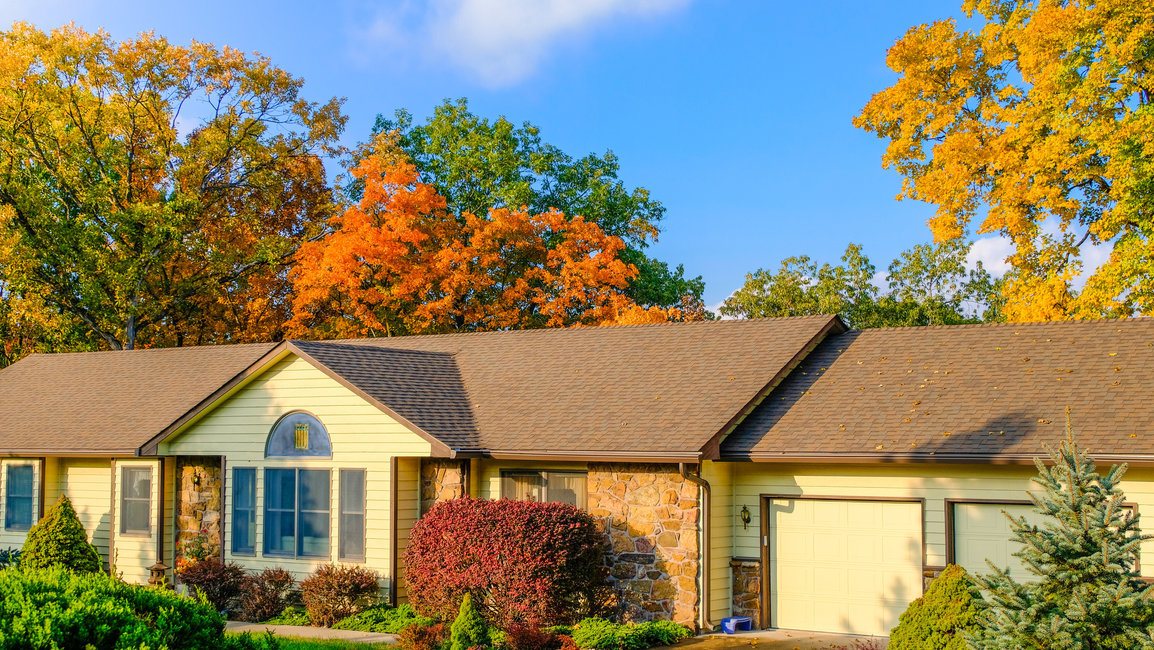
Cost to Raise Roof on a Ranch House
The reason that most ranches are raised, rather than the roof being raised, has to do with how the ranch is laid out. Most ranches have very high ceilings with open floor plans and a specific, elongated shape. While you may raise the roof, it is more cost-effective and better for the layout to raise the house and build below. If you want to raise the roof, expect costs of approximately $100,000 for the addition, rather than the lower costs of $30,000 to $50,000 to raise the house.
Raised Ranch vs Split Level
Two types of ranch-style homes may have a second level. These are known as raised ranches and split levels. Raised ranches can be created in two ways. It may be built into the side of a hill so that it appears to have 1 or 1½ stories but actually has two. The main level is usually at ground level, and the second level extends backward toward and beneath the ground.
The second type of raised ranch is a single-story ranch that was lifted so that a second story can be built beneath. This is the traditional meaning of the term raised ranch. The original structure is literally raised. This is a great way for those with an existing ranch to add to their home without changing the footprint.
In a split level, most of the home is a single level. The split level is a section on one end of the home that is 1½ or 2 stories. This design plays into the ranch's asymmetrical nature. They tend to be longer than the raised ranch.
Costs between the two vary but not much. Raised ranches tend to have a smaller footprint than a split level. This means it has a smaller roof and foundation. Because so many building costs come from these two areas, the raised ranch may be slightly less expensive than the split level. However, many other variables could impact the project cost, meaning that while the low-end of costs may be different, with the raised ranch being slightly less, the high-end costs tend to be equal.
Costs below are for the average 1,700 sq.ft. ranch built using conventional methods. The costs are the same for both types when built using modular technology.

| Type | Average Costs (Labor Included) |
|---|---|
| Raised | $221,000 - $510,000 |
| Split-Level | $255,000 - $510,000 |
Bungalow vs Ranch
Ranches are a popular home type for contemporary living. They have an open floor plan and are usually single-level, making them easy to build and live in. They tend to be smaller than the average home size.
Another home that also tends to be smaller-than-average is the bungalow. Bungalows are a type of Craftsman home, so they are also considered modern but have a very different appearance. While a ranch is sprawling and asymmetrical, the bungalow is more compact, usually with 1½ stories. However, you can build some newer ultimate bungalows approaching 3,000 sq.ft. with two full stories. It is uncommon for ranches to be larger than 2,000 sq.ft. because most are single-story homes.
The biggest difference between the two is the layout. Ranches have an open floor plan. Bungalows have a more closed floor plan and are usually described as cozy with built-in shelving and cabinetry, while ranches are considered more contemporary and spacious.
Below are the average costs to build both structures types, using traditional stick-building methods based on their most common sizes.

| Type | Average Costs (Labor Included) |
|---|---|
| Bungalow | $125,500 - $345,000 |
| Ranch | $200,000 - $600,000 |
Enhancement and Improvement Costs
Average Cost to Paint a Ranch House
If you want to give your ranch a fresh coat of paint during building or after it has been lived in for a few years, expect to pay $1,000 to $2,000. Ranches have a low-pitch roofline and are usually single-story. This makes the cost to paint them typically less than the cost to paint larger homes.
Interior Designer
It is very common when building a new home to enlist an interior designer as part of the job. Interior designers help determine the correct layout and coordinate colors, finishes, and furnishings. The price range to hire an interior designer is from $75 to $450 an hour.
Additional Considerations and Costs
- Historical recognition. Having been around for a century, some ranches are now eligible for recognition through the National Register of Historical Places. This may lead to a revived interest in the style.
- Average size. Ranches built through the 70s were mostly constructed between 1,000 and 1,500 sq.ft. The average size is now between 1,400 and 1,700, but it is possible to go larger with new construction.
- Bedrooms. Nearly all ranches contain three bedrooms. Keep in mind, however, that most new builds are customized with varied floor plans and amenities.
FAQs
- What does a ranch house look like?
The traditional ranch is a one-story home built low to the ground in an "L" or "U" shape. They are typically asymmetrical with a low-pitch roofline.
- How much does a ranch-style house cost to build?
The average cost to build ranges from $200,000 to $600,000, depending on the size, style, and materials.
- How much does it cost to build a 1,500 sq.ft.ranch home?
The average cost to build a 1,500 sq.ft. ranch is around $195,000 to $450,000 for conventional building and between $75,000 and $345,000 for modular building.
- Is a ranch home more expensive to build?
Yes, with the open floor plan and truss roof, ranches may be slightly more expensive to build than other styles.
- Are ranch-style homes more efficient?
Yes, the open floor plan and single-level make them easy to heat, cool, and clean.
- Do ranch-style homes have basements?
They may have basements, but many do not. The most common foundation for a ranch is a slab. However, split levels have a partially finished basement.
Remodeling Terms Cheat Sheet
Definitions in laymen's terms, cost considerations, pictures and things you need to know.
See full cheat sheet.
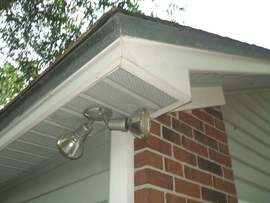 1 Rooflines: Construction material, typically composed of vinyl or aluminum, used to enclose the underside of eaves and ceilings
1 Rooflines: Construction material, typically composed of vinyl or aluminum, used to enclose the underside of eaves and ceilings
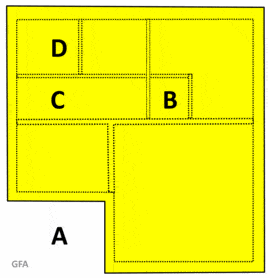 2 Footprint: The entire area of ground covered by a building, including the exterior walls and porch or patio areas
2 Footprint: The entire area of ground covered by a building, including the exterior walls and porch or patio areas
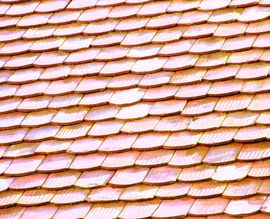 3 Shingle: A smooth, uniform, flat piece of construction material, available in a wide variety of materials and laid in a series of overlapping rows, used to cover the outside of roofs or walls to protect against weather damage and leaks.
3 Shingle: A smooth, uniform, flat piece of construction material, available in a wide variety of materials and laid in a series of overlapping rows, used to cover the outside of roofs or walls to protect against weather damage and leaks.
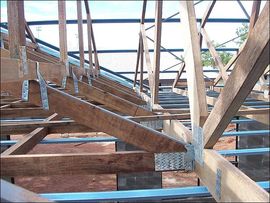 4 Truss: Structural framework used to support a roof
4 Truss: Structural framework used to support a roof
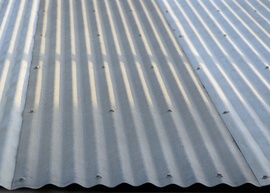 5 Fiber cement: A building material made with cellulose fiber, concrete, and recycled materials such as glass
5 Fiber cement: A building material made with cellulose fiber, concrete, and recycled materials such as glass
6 Recessed lighting: A type of recessed lighting where the light is installed into a hole in the ceiling, giving downward light.
Source: https://www.fixr.com/costs/build-ranch-house










0 Response to "Large Ranch Home That is Easy to Build"
Post a Comment